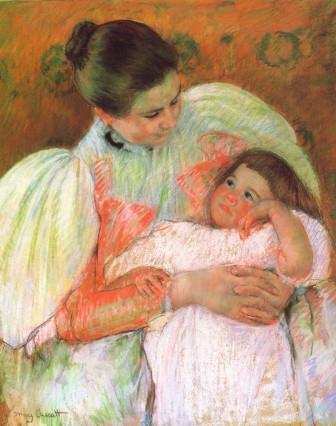
Cassatt (1896/97) Nurse and Child
Education versus biology |
| For decades we have been discussing our educational systems. When should institutionalized education start? Should we have one system for all children? Should teachers for all levels go through the same academic curriculum? The last turn in this never ending conflict is the proposition, even Kindergarten nannies should graduate from the same academic courses as other teachers do. |
| Of course we all hope for the best treatment and fostering for our kids, but I have my doubts that university professors should always be their best company. As a child, I sometimes felt very fond of quite simple people who 'spoke my language', and I often felt bored by my parents who were both professional school teachers - although my parents, from their own academic formation, knew how to teach me complicated things. |
| In a somehow old-fashioned style, I would say that a good contact with a child comes from the heart. We all have a spontaneous positive feeling towards little children. Such a feeling cannot (and need not to) be aroused by academic courses. Most (practically all) parents love their children and act as their first target of identification. We (hopefully) will never demand any academic certificate before we allow someone to become a mother or a father. |
| In very similar terms I see the role of a kindergarten nanny. For my standards, she needs no academic merits; she will know spontaneously how to treat her ward in the best way. I would not proclaim that she needs no professional formation at all, but I do not see any sense in sending her to a university. This would just build up unnecessarily high barriers for entering into this profession. Some knowledge comes from oral tradition, but other things we know by our hormones and genes. Treating children in the right way belongs to the second class. |
| Apparently, evolution deemed it favorable to hard-wire child-care to our biological rather than to our cultural heritage. Since the survival and blossom of children is so essential for the conservation of any species, it is not entrusted (at least not alone) to the rapidly changeable cultural tradition. Cultural tradition, nevertheless, plays a role in fine-tuning our habits, even if they are predominately biologically determined. Therefore, it appears reasonable to surround child-care by an intelligent organizational framework. |
| This framework, based on centuries of experience, decides on logistic strategies as e.g. obligatory years of education, levels of complexity, preference of group versus individual teaching, and the best developmental stage for specializations. These specific methodological approaches are subject to continued revision and improvement; for recent examples, see Derex et al. (2013) and Freeman et al. (2014). But it should not be the job of the practitioner in direct contact with children to decide on these wider strategic concepts. |
| It may be justified to allow only academics to direct any educational institution, but the decision on who to be in regular contact with the children should not be linked to any academic achievements, but rather to kind-heartedness and joyful character, properties that are difficult to teach in an academic setting. |
| 7/14 < MB
(10/14) > 1/15 Education / Erziehung |
Derex
M, Beugin M-P, Godelle B, Raymond M (2013) Experimental evidence for
the influence of group size on cultural complexity. Nature 503: 389-391 Freeman S, Eddy SL, McDonough M, Smith MK, Okoroafor N, Jordt H, Wenderoth MP (2014) Active learning increases student performance in science, engineering, and mathematics. Proc Natl Acad Sci USA 111: 8410-8415 |